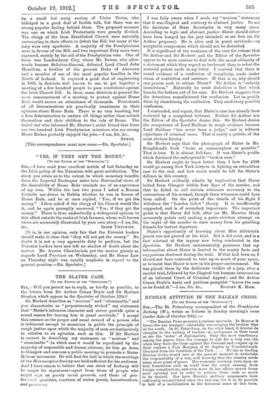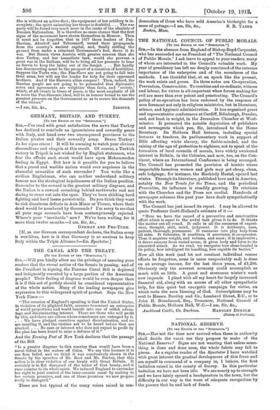RUSSIA'S ATTITUDE IN THE BALKAN CRISIS.
[TO THE EDITOR OF THE "SPECTATOR."] SIE,—The St. Petersburg correspondent of the Frankfurter Zeitung (W.), writes as follows in Sunday morning's issue (under date of October 10th) :— "The Russian Press presents a curious spectacle. In Moscow it blows the war trumpet—cheerfully encouraging the brother Slav in the south. In St. Petersburg, on the other hand, it devotes its energies to the writing of leaders—as ambiguous in their tenor as are the 'notes' of diplomatists. Only the most reactionary among the papers have the courage to call for a holy war, the while they wave the Cross against the Crescent and conjure up to their readers a rata Morgans of St. Sophia in Constantinople liberated from the thraldom of the Turk. . . . No one in leading Russian circles would care at the present moment to undertake the responsibility of a war, well knowing that the country needs many more years of peace. Her economic recovery rests upon no firm foundation Each as could bear the strain ensuing from foreign complications, and even more do her affairs nearer home need external rest in order to achieve those ends so much to be desired. Nor have Russia's military armaments been sufficiently reconstituted since the last war for it to be possible to talk of a mobilization in the technical sense of this term. She is without an active fleet; the equipment of her artillery is in- complete ; the spirit animating her troops is doubtful.. . . The war party will be found very much more in the ranks of the idealists of Russian Nationalism. It is therefore no mere chance that the first signs of the movement have shown themselves in Moscow. Then it must not be forgotten that in 1877 those leaders of Pan- Slavism, Aksakoif and Tchernaieff, issued their propaganda from the country's ancient capital, and, finally cutting the ground from under a reluctant Government's feet, drove it to war. But Russia views Austria with greater concern than she does Turkey, and her immediate task, would she prevent a great war in the Balkans, will be to bring all her pressure to bear on Servia to keep the latter out of the Sanjak. . . But hardly less disconcerting must be the prospect of a cessation of hostilities. Suppose the Turks win; the Pan-Slave are not going to fall into their arms, but will cry the louder for help for their oppressed brothers. And if the Slavonic allies conquer ? Then, indeed, the Russian people are not going to be persuaded that diplomatic notes and agreements are weightier than facts, and society,' which, at all events in times of peace, is the most emphatic of all to voice the Pan-Slavonic ideal, will be in honour bound to use the greatest pressure on the Government so as to secure the demands of the victors."















































 Previous page
Previous page